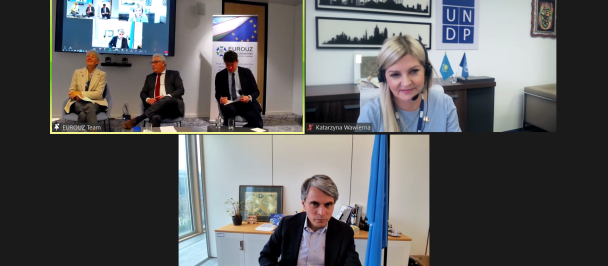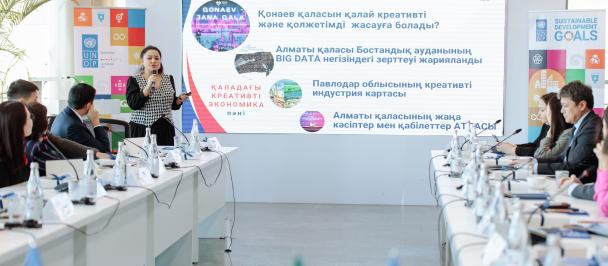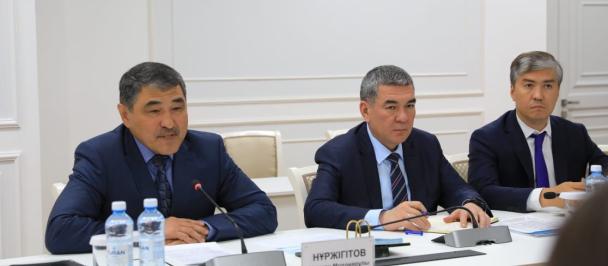Speech of UNDP Resident Representative in Kazakhstan Katarzyna Wawiernia at the roundtable on EU-Central Asia cooperation for economic growth
February 2, 2024

Dear Ambassadors,
Dear colleagues,
A warm greeting from snowy Astana! Thank you for inviting UNDP Kazakhstan to this important discussion and hear our voices from the field.
We heard a lot today about expected impact of Trans-Caspian International Trade Corridor on boosting economies, income, and employment, and as UN today we brought more people centered approach, but we heard less on challenges and possible risks. As we know from the examples of already accomplished other transport infrastructure investments, Central Asian countries may encounter number of challenges related to their sustainable development and environmental protection especially.
No doubt development of transport corridor in CA will directly contribute to vital regional development aspects, including the generation of decent employment, fostering resilient agriculture, enhancing the business environment, promoting education, and facilitating sustainable production. Trade expansion is an accelerator for other SDGs as they are interconnected.
Sustainable Development Goal 9, transport infrastructure plays a pivotal role in advancing sustainable development by expediting and fortifying a substantial number of SDGs. Based on analytics of CA SDG Platform, the attainment of nearly 50% of SDG targets and indicators depends significantly on the Central Asian region's capacity to develop innovative infrastructure, with a particular emphasis on establishing new transport connectivity opportunities.
Since 2015, UNDP has been actively working with the Governments of Central Asia states on integration of SDGs into the strategic planning and budgeting. We have created the Central Asia Regional SDG Platform, funded by the European Union, which offers a comprehensive perspective on the interconnectedness of Sustainable Development Goals with key trends in regional development. This is a digital solution to track the progress and note challenges on SDGs implementation for guiding decision-makers.
We strongly believe that data collection and exchange frameworks within UNDP lead initiatives like Central Asia SDG platform and Central Asia trade intelligence platform could be tailored further to guide the policy design and allocation of investments, measure progress and mitigate potential risks related to SDGs achievement related specifically to this corridor.
Moreover, this tool will enable swift call to possible socio-environmental risks. We invite our development partners to use this instrument more for evidence-based and risk-informed decision-making.
There are direct costs of transport development to the environment (deforestation, loss of biodiversity, and general degradation of ecosystems, carbon dioxide (CO2) emission). The transport sector is a major consumer of energy resources and also one of the major emitters of carbon dioxide. There are important trade-offs between economy and welfare and impacts on environmental quality.
We recommend adopting a sustainable landscape management approach for the future development of the Caspian region. In this regard, UNDP in partnership with the Government of Kazakhstan, is planning a large-scale initiative, aimed at promoting an integrated ecosystem-based approach to conserve key species and habitats of the Caspian Sea and ensure sustainable economic development for local communities. Throughout its history, the Caspian Sea has been a very important source of biological resources. They make up a single ecosystem that require strong protection from natural and people-made factors.
We would like to continue supporting a common strategic framework for promotion of a sustainable marine economy and shift from a focus of revenue generation and production systems to an ecological-centered vision of systems and wealth and well-being, and therefore on an integrated approach to conservation, economy, livelihoods, and jobs. We invite our development partners to join us in this endeavor and do no harm to unique ecosystem.
Given the benefits of SDG acceleration power of transport connectivity projects, we believe it is possible to reduce the burdens of environmental and social costs by seeking the inputs of the international and local partners into a joint action. Over the years, UNDP has accumulated experience and expertise that can be used to meet the challenges of our programme countries. The right path of Central Asian states towards sustainable development should be accompanied with the data-driven, evidence-based and risk-informed decision making, using the knowledge and best practice worldwide. We stand ready to support.

 Locations
Locations



